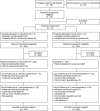Screening and Care for Emotional and Cognitive Problems After Ischemic Stroke: Results of a Multicenter, Cluster-Randomized Controlled Trial
- PMID: 40489719
- PMCID: PMC12151330
- DOI: 10.1212/WNL.0000000000213774
Screening and Care for Emotional and Cognitive Problems After Ischemic Stroke: Results of a Multicenter, Cluster-Randomized Controlled Trial
Erratum in
-
Screening and Care for Emotional and Cognitive Problems After Ischemic Stroke: Results of a Multicenter, Cluster-Randomized Controlled Trial.Neurology. 2025 Sep 23;105(6):e214055. doi: 10.1212/WNL.0000000000214055. Epub 2025 Aug 28. Neurology. 2025. PMID: 40875934 No abstract available.
Abstract
Background and objectives: Evidence regarding effectiveness of screening for emotional and cognitive problems after stroke is lacking. The primary aim of this study was to test the hypothesis that an intervention focusing on screening and care for emotional and cognitive problems after stroke would improve societal participation at 1 year. Second, we tested the hypotheses that this intervention would improve emotional and cognitive concerns, symptoms of anxiety, symptoms of depression, quality of life (QoL), self-efficacy, and disability.
Methods: This multicenter, patient-masked, cluster-randomized controlled trial assigned clusters (1:1) to intervention or usual care. Clusters were Dutch nonuniversity hospitals with a stroke unit. Ischemic stroke patients aged 18 years and older discharged home without inpatient or outpatient rehabilitation were included. The intervention was a consultation conducted by a specialized stroke nurse at the outpatient neurology clinics at 6 weeks after stroke and included screening for emotional and cognitive problems, screening for participation restrictions, self-management support, and, if needed, referral to rehabilitation services. The primary outcome was societal participation (Restrictions subscale of the Utrecht Scale for Evaluation of Rehabilitation-Participation [USER-P-R]) 1 year after stroke. Secondary outcomes were cognitive and emotional concerns (Checklist for Cognitive and Emotional Consequences following Stroke), symptoms of anxiety (Hospital Anxiety and Depression Scale-Anxiety subscale [HADS-A]), symptoms of depression (HADS-Depression subscale), QoL (5-level version of the EuroQoL 5-dimensional questionnaire [EQ-5D-5L], EuroQoL Visual Analog Scale [EQ-VAS], and Patient-Reported Outcome Measurement Information System [PROMIS-10]), self-efficacy (General Self-Efficacy Scale), and disability (modified Rankin Scale) at 3 and 12 months. Continuous outcome data were analyzed using a mixed model for repeated measures, and ordinal data were analyzed with an ordinal mixed-effects model.
Results: Between August 14, 2019, and May 11, 2022, a total of 531 patients were included in 12 clusters. The mean age was 70.6 ± 9.7 years, 40.0% were female, and the median NIH Stroke Scale score was 2 (2). Two hundred sixty-four patients were included in 6 hospitals providing the intervention and 267 patients in 6 hospitals providing usual care. Primary analysis demonstrated no difference in USER-P-R score at 1 year after stroke (mean difference [MD] 0.77; 95% CI -2.46 to 4.06; p = 0.652). Secondary outcome analyses at 3 months showed a MD between the intervention group and usual care group in HADS-A scores of -0.86 (95% CI -1.33 to -0.39), a MD in EQ-5D-5L index scores of 0.044 (95% CI 0.022-0.065), and a MD in EQ-VAS score of 2.90 (95% CI 0.69-5.10). Secondary outcome analyses at 1 year demonstrated a MD in EQ-5D-5L index scores of 0.043 (95% CI 0.021-0.064).
Discussion: Screening for emotional and cognitive problems did not improve societal participation at 1 year after stroke. The potential for improvement in anxiety and QoL warrants further investigation. Cost-effectiveness will be analyzed in our upcoming economic evaluation.
Trial registration information: Netherlands Trial Register: NL7295. Registered: September 25, 2018. First patient enrolled: August 14, 2019.
Classification of evidence: This study provides Class III evidence that, in patients recovering from an ischemic stroke, active screening for emotional and cognitive problems at 6 weeks after stroke did not improve societal participation at 1 year.
Conflict of interest statement
The authors report no relevant disclosures. Go to
Figures
References
-
- Emberson J, Lees KR, Lyden P, et al. Effect of treatment delay, age, and stroke severity on the effects of intravenous thrombolysis with alteplase for acute ischaemic stroke: a meta-analysis of individual patient data from randomised trials. Lancet. 2014;384(9958):1929-1935. doi: 10.1016/S0140-6736(14)60584-5 - DOI - PMC - PubMed
Publication types
MeSH terms
LinkOut - more resources
Full Text Sources
Medical
Research Materials

